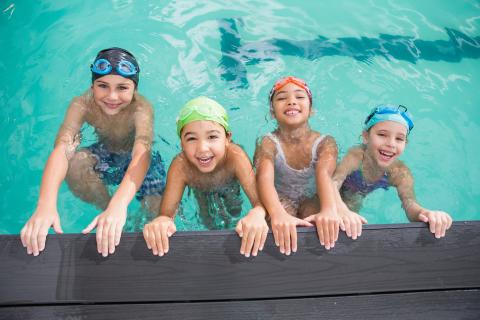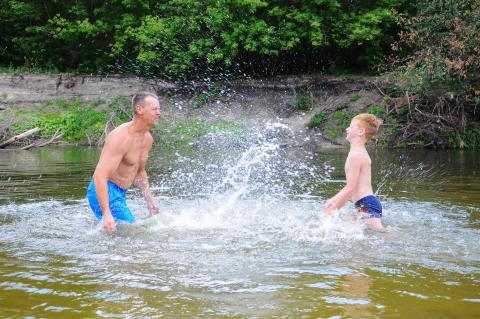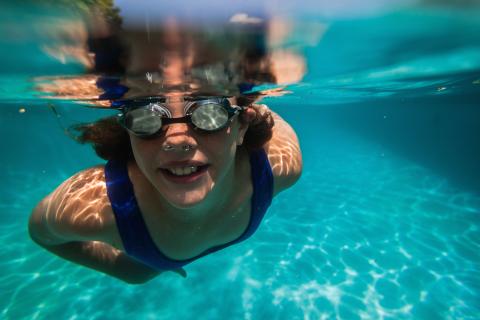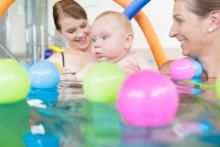Healthy Swimming
Swimming and other water activities are great ways to be active, have fun, and live a healthy life. However, they are not risk free. There can be germs in the water that can make you sick and lead to waterborne illnesses.
The highest number of waterborne illnesses happen during the summer months. This is because more people go swimming and enjoy other water-related activities during that time.
We all share the water we swim in, and each of us needs to do our part to help keep ourselves, our families, and our friends healthy.
Healthy swimming 101
You can get waterborne illnesses from unclean water. They can be caused by germs and chemicals found in the water where we swim. Waterborne germs can be found in all sorts of places like swimming pools, hot tubs, water parks, etc. You can get sick if you accidentally swallow water with germs in it, breathe in small water droplets with germs, or if you just come into contact with water that has germs in it.
Waterborne illnesses can also be caused by chemicals or toxins in water. Examples include fumes from pool disinfection chemicals in the air, or toxins from blue-green algae during harmful algal blooms.
There are many different types of waterborne illnesses. Waterborne illnesses can affect many parts of the body, including:
- Stomach and intestines
- Skin
- Ears
- Lungs
- Eyes
- Brain and spinal cord
- Wound infections
Some illnesses are more common in chlorinated water, but they can happen after contact with any kind of water body, including lakes and rivers.
Some waterborne illnesses are much more common than others. The most common symptom of waterborne illnesses is diarrhea. Some germs that can cause diarrhea are Crypto (short for Cryptosporidium), Giardia, Shigella, norovirus, and E. coli.
Anyone who spends time in unclean water can get sick from a waterborne illness. That is why it is important to know how to swim healthy!
While anyone can get sick with a waterborne illness, small children, the elderly, and people with a weakened immune system are more likely to get sick.
For illnesses where you need to swallow the germ to become sick:
- Children get more waterborne illnesses because they are more likely to swallow the water, and splash and play in the water.
- You are more likely to become sick if you allow unclean water to enter your mouth, even if you don't swallow the water.
- You can also become sick if unclean water gets splashed up your nose or you put your head under water.
Most of the germs that cause waterborne illnesses are brought into the water by people with the illness, animals, or wastewater runoff. Some germs, such as the bacteria that cause Legionellosis, naturally live in water and can make you sick when their presence is not managed correctly.
It is extremely important not to swim while you have diarrhea, because you could be the person who brings germs into the pool that can make other people sick. More than one in five American adults do not know that swimming when you are sick with diarrhea can make the whole pool unclean and make other swimmers sick. You don't have to have an accident in the pool to make the pool unclean.
If we work together, we can help prevent others from becoming sick!
If you have an accident in the pool or see someone have an accident, tell a lifeguard or staff member right away so that the pool can be cleaned and treated. A single diarrheal accident can put over 10 million Crypto germs into the water, enough germs to make you sick with a single mouthful of pool water.
Many people think that chlorinated water is sterile and that all germs that enter the water are killed instantly. However, some germs live for longer periods of time in chlorinated water than others.
While most germs are killed by chlorine in pools within a few minutes, Crypto is very chlorine tolerant and can live up to 11 days in the water. For this reason, Crypto is the number one cause of outbreaks associated with recreational water in the U.S.
Remember that untreated water bodies, such as lakes and oceans, have no disinfectant in them. Here, germs live longer until they are killed by sunlight or heat.
In recreational water, it is important to remember that chlorine and chemicals do not kill the bacteria and germs instantly, and when sweat and urine exist in the pool, the chlorine does not work as well. To protect everyone near and around the swimming area, swimmers need to be safe in the pool.
Steps the public can take
- Keep the poop, germs, and pee out of the water.
- Don't swim when you have diarrhea (and don't swim for two weeks after illness if you have Crypto).
- Don't pee in the pool.
- Shower with soap before you start swimming and wash your rear end well! Be sure to rinse before you get back in the water.
- Wash your hands after using the toilet.
- Don't swallow the water you swim in.
Steps parents of young children can take
- Remember that swim diapers DO NOT prevent germs from getting into the water.
- Take the children on bathroom breaks every 60 minutes or check diapers every 30–60 minutes.
- Change diapers in the bathroom or diaper changing areas and NOT at poolside to reduce the risk that germs can get into the water.
- Wash your child well with soap and water (especially the rear end) before returning to the pool.
- Wash your hands after using the toilet or changing diapers.
- Teach your children not to swallow the water they swim in.
- Waterborne Illnesses: DHS homepage for common waterborne illnesses.
- Centers for Disease Control and Prevention's (CDC) Healthy Swimming page: Information on how to stay healthy and safe while swimming.
- Pool Chemical Emergencies: Information on pool chemical safety.
- Guidelines for Keeping Your Pool Safe and Healthy: Information from CDC on pool safety.
Questions about waterborne illnesses? Contact us!
Phone: 608-267-9003 | Fax: 608-261-4976




